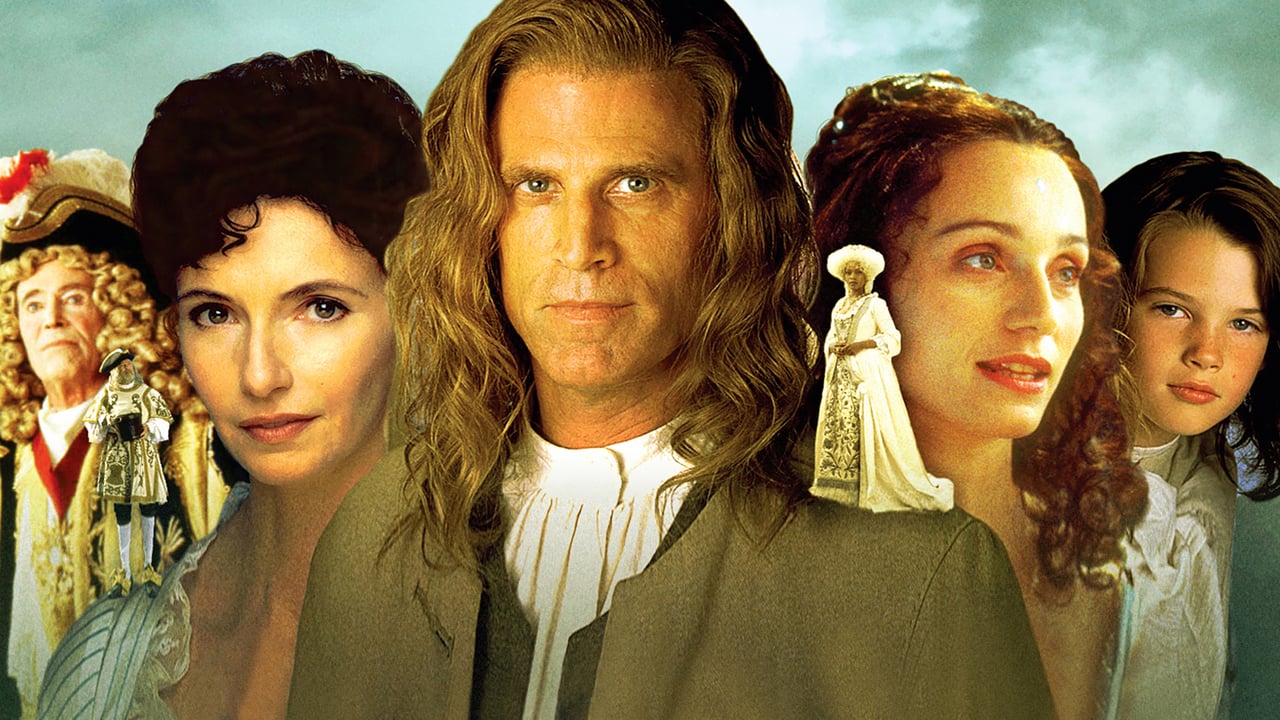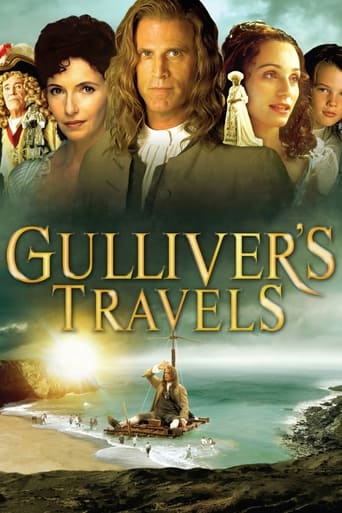Hadrina
The movie's neither hopeful in contrived ways, nor hopeless in different contrived ways. Somehow it manages to be wonderful
Marva
It is an exhilarating, distressing, funny and profound film, with one of the more memorable film scores in years,
Geraldine
The story, direction, characters, and writing/dialogue is akin to taking a tranquilizer shot to the neck, but everything else was so well done.
Jerrie
It's a good bad... and worth a popcorn matinée. While it's easy to lament what could have been...
Blueghost
When I saw this movie first air I was captivated by the visuals and tale of Gulliver's actual travels. The one thing I really didn't get, and has always perplexed me, was the subplot about Gulliver returning as a nut case, afflicted with some form of shock or psychosis. I just didn't get it.And even watching it now, I still don't understand why Ted Dansen's character was turned into a raving lunatic as a narrative construct. It could have worked without this extraneous element. But, I better get to reviewing the film.The art direction of this Halmark production are unsurpassed. The SFX for the time were state of the art. We're with Gulliver and see his viewpoint as he interacts with tiny people, giants, kings, queens, intelligent animals and people who think they're intelligent but are blinded by their own intellect. Each social group he comes across is a commentary on human nature, and Dansen's character regales his caretakers with stories of his travels from which the commentary comes forth.As usual with Hallmark, little expense is spared to create a visual tapestry of 19th century England the strange continent to which Gulliver has travelled, and subsequently returned. Costumes, sets, locations, even the acting talent, is all of the first caliber for this very lavish production. Liberties are taken with the tale, as with all adaptations to the visual media from written work. Even so, it is a remarkable piece of work. The mental health theme is, to my way of thinking, very labored and doesn't add to the story, though it does seem to serve a purpose in bringing a romantic struggle to the original tale. Therefore the drama that might have been has been infused with a heightened sense of imperativeness, as we witness Gulliver struggle with his recent past. Does it work? It certainly brings an element of Gulliver questioning his social reality in England, but is, in my opinion, melodramatic, and just plain stupid. The social commentary could have just as easily been told without this aspect. We could have seen Gulliver come home, setup shop, be welcomed, and then tell of his adventures to people visiting his practice. But, it was not to be, and as I watched this very lush production, I kept asking myself why Hallmark approved of such a skewed tale. But, all we can do is shrug our shoulders, and accept the final product. Still, would it have hurt to have a normal narrative?All in all it is an impressive retelling of the classic tale, and all the social commentary is there, if not in point of fact made explicit to the viewing audience.Enjoy it for what it is.
miningphd
This adaption contains two parts: 1. The "now" time, when Gulliver is at home in England and soon is put into a mental asylum by the Evil Dr. Bates 2. The "described" time, in which Gulliver describes his travels.The times are interspersed with a very choppy tempo, which makes willing suspense of disbelief far more difficult than it would have been if the movie simply would have discarded that part, and followed the book as written. In the book, there is no Dr. Bates, no asylum, and Mrs Gulliver gets very little mention. The travels - in plural - are depicted as one in the movie. There are several movies covering the topic of sane people dumped into asylum by some nasty person out there, look at them if you want that stuff. The "now" time part adds absolutely nothing to the story's value, is a complete invention by the movie adapters, and takes valuable time from the real story. All the time when this was going on I was longing for the next bit of real travel to be shown.So much for the drawbacks. The parts which actually are part of the real story are well done, and the CGI is really well done for its time. Many small (and a few medium-sized) parts of the real travels are simply cut out, but that does not make the story halt. This is AFAIK the only version which depicts all four travels, and for that the movie should get special mention. The two interspersed parts get approximately equal time. I rate the first part 0 out of 10, and the actual travel coverage as 8/10. Averaging out, I give it a 4/10. If only they would have cut the rubbish and focused 99% on the actual travels, since that cut would have freed up a lot of time much better spent on filling in the details cut from the travels. Why some adapter think that he is gifted enough to improve upon Swift's work, I do not know. My best guess is that CGI was so costly back in 1996 so that the movie company felt a need to incorporate a lot of filler which did not need elaborate sets, GCI, etc. in order to keep total costs under some limit, while at the same time producing a mini-series which clocked in at some set number of minutes.
julian_west
Excellent story-telling and cinematography. Poignant, biting social commentary.Superb effects. Well-filmed and acted.However, the parallel action between the present and the travel adventures (though very well done) at times drags on a little too much (about 3 hrs), and over-interrupts the flow of the story.I first read the book as a child, and enjoyed the parts about the giants and the tiny people -- but the book lost me when it got to the floating island and the land of the "yahoos"! Well, although the adventure plot may sound like a children's story, it's in fact a very adult story, full of symbolism about the moral decay in England at the time of Jonathan Swift, the author of the novel that the film is based upon.
northmoor1
Considering the rubbish Hallmark has come up with since, it's easy to forget how good this was. As an adaptation of the book, this is easily the best version, and is the only version to include all four parts of the book. (I do have one reservation, which will be addressed). Obviously, some satirical points are lost, as the book contains many 'topical' references to persons and occurrences from the early 18th Century which would go completely unnoticed nowadays by anyone who has not made an academic study of the book. The book had Gulliver make four separate voyages to each land, but here (as in most versions that include more than one part) Gulliver discovers all the lands in one long voyage. Whilst this removes a reasonably important aspect of the book's framing device (The progressively worse treatment of Gulliver by the ships crews reflect Gulliver's own estrangement from the human race) it does make the film flow better. The films own framing device allows much more information to be imparted, although I do believe too much time is spent on the back-story accompanying it.The Lilliputian and Brobdingnagian segments are very well done- all the major points covered in the book are dealt with very economically. It is with the next part that my reservation arises. Laputa, the Academy and the Glubbdubdrib necromancy are very well adapted, but the depiction of the immortal Struldbruggs show an incredible lack of courage. In the book, the Struldbruggs are cursed with immortality, but not eternal youth and depicts gibbering, desiccated husks millennia old. Here, the 'curse' of immortality is simply blindness, and totally betrays the book. However, this remains the first time (to my knowledge) that the Houyhnhnms section has been filmed, a section that has given Swift a reputation (probably undeserved) of being a misanthrope). Here, the odious Yahoos are kept as vile as they are in the book and, although the impact of the ending has been softened, the blow is still there.The film is very well done indeed, with perfect art design, costuming and atmospheric direction by Sturridge- the Glubbdubdrib section is brilliantly eerie. Ted Danson is nothing short of fantastic, in a studied yet emotional performance. Steenbergen is less memorable, but still effective. The star-studded supporting cast impresses throughout, especially to O'Toole's Lilliputian Emperor and Nicholas Lyndhurst's Clustril (it is oddly satisfying to have a lead actor in 'Cheers' sharing scenes with a lead actor from 'Only Fools and Horses!) The music is perfect, with the rousing theme music, the Indian- influenced but otherworldly Laputan music and the primitive percussion of the Yahoo sections.In summary, this is a great, though qualified success. There will never be a film version that does full justice to the book, but this is as close as we're probably going to get.

